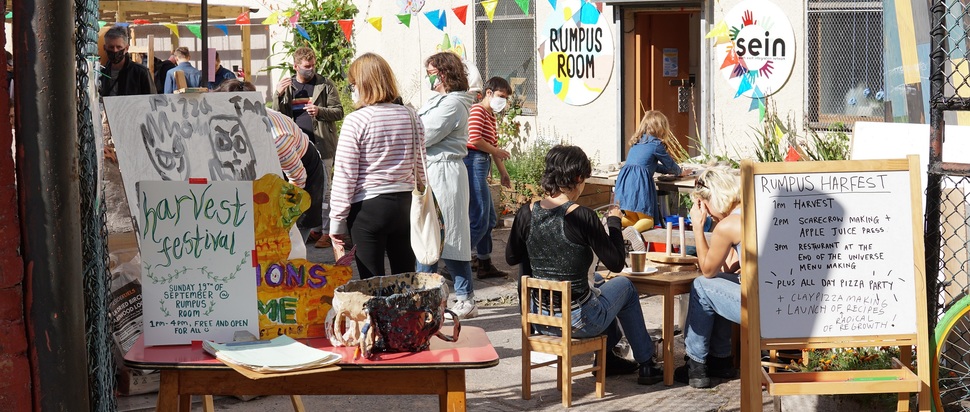How Glasgow's community organisations are struggling for space
We're well aware: money's tight. But how does this impact the community organisations that allow us to come together and connect? One writer explores the importance of maintaining spaces and unpacks the trials and tribulations of funding applications
Late last year Rumpus Room, an artist-led initiative that collaborates with children and young people on art and social action projects, were posed with an existential question: was the space they were creating for their members and young people rooted in the physical or the atmosphere? This was in response to the unexpected prospect that they would have to lose their studio space where they hosted everything from gardening clubs to queer family meet-ups, fostering and nurturing a community for the past three years.
“Our group has become a physical organism that can exist anywhere, but as we have grown so has the space,” says Leo, one of the artists. For many community organisations around Glasgow, the debate around space straddles these two sentiments. Can a space be created for facilitation, dialogues and mobilisation without bricks-and-mortar?
Amid the cost of living crisis, rental crisis, Brexit, and the pandemic hangover, many community organisations are wondering how tenable their space situation really is. Some, such as Glasgow Autonomous Space, have already had to leave their space due to spiralling costs. Both Crossroads and Kinning Park Complex – two community hubs in Glasgow’s Southside – are toiling with unsuccessful funding applications and, as a result, opening hours and staff numbers are being drastically shaved.
“With all public spaces being privatised, places like here are vital,” says Spyro, a youth worker at Crossroads. “Space like this lets individuals encounter people and experiences they wouldn’t otherwise.”
Charlie*, a worker at Kinning Park Complex, agrees. “Our community meal is not just a service environment, it is about building connections,” says Charlie. “With our own space we have been able to make everyone’s needs met, from installing a lift to creating gender neutral toilets.”
For many community organisations, this is why physical space is so important: intercultural conversations are facilitated and accessibility is literally built in, sentiments that our increasingly detached and private lives are lacking. Having a space which communities can return to and rely on is key.
But that blank white space of the funding application can also prove inaccessible to many organisations. These over-complex applications often see community organisations work overtime, late nights and early mornings to be expected. Many organisations do not have the time or resources to complete these applications on a rolling basis. For groups whose first language may not be English, this can be an additional barrier.
The Scottish Refugee Council are trying to make the funding process fairer. Recently, they worked with the National Lottery Communities Fund to train a cohort of New Scots to panel funding applications. This funding is primarily targeted to grassroots organisations such as constituted groups, a much easier title to obtain than ‘charity’ or ‘community interest company’, therefore easing some of the bureaucracy involved with funding applications. Their application forms are concise and webinars for applicants explain exactly what the panel is looking for with every question.
Despite positives such as this, the overall situation remains bleak. Glasgow City Council have also recently announced that libraries, pools and galleries will have their opening hours slashed, the Botanics now incur an entry fee, and a week of free events at Kelvingrove Bandstand have been quietly shelved. The council also recently announced the outcome of the Glasgow Communities Fund, a once-every-three-years opportunity that is one of the most significant sources of funding in the city for community organisations.
South East Integration Network (SEIN) – a network of organisations centred around diversity and community integration – was unsuccessful in their bid for this fund for the first time ever. The network’s future is for now uncertain past the summer. “There is so much that can be achieved by creating space... But this tense climate of funding is just not helping,” says Communications & Engagement Coordinator Jess, who is also part of the community food project Kin Kitchen.
Many organisations note that funders don’t see the importance of space when writing guidelines. “You can’t just get funding to do a move,” says Ardis, one of the artists at Rumpus Room. As most funding these days is for short term projects, it is difficult to prove in an application that securing and upgrading space is worth the investment. “I want there to be more longer term funding for sustainability of projects.”
Glasgow Zine Library (GZL) is one of few organisations able to move to a new space. To facilitate the move, GZL has set up a crowdfunder – through which they've received a match fund pledge from Glasgow City Council – but still hope to secure further funding in the future. “People often assume if you have public funding, you must be able to do whatever you want with it, but there are very few funds that are unrestricted,” says LD, director of the library. “There are so many project-focused funds out there… but not many that are earmarked for capital costs.”
So what does the future hold for community organisations as funding pots shrink and more spaces are forced to close? For many organisations, collaboration and pooling resources seems to be the future. “Kin Kitchen loves to collaborate with others,” Jess sighs, “but this should come from choice, not necessity.”
There should be space for each community organisation to flourish on its own terms – and there is. We simply must fund it.
*Names have been changed
